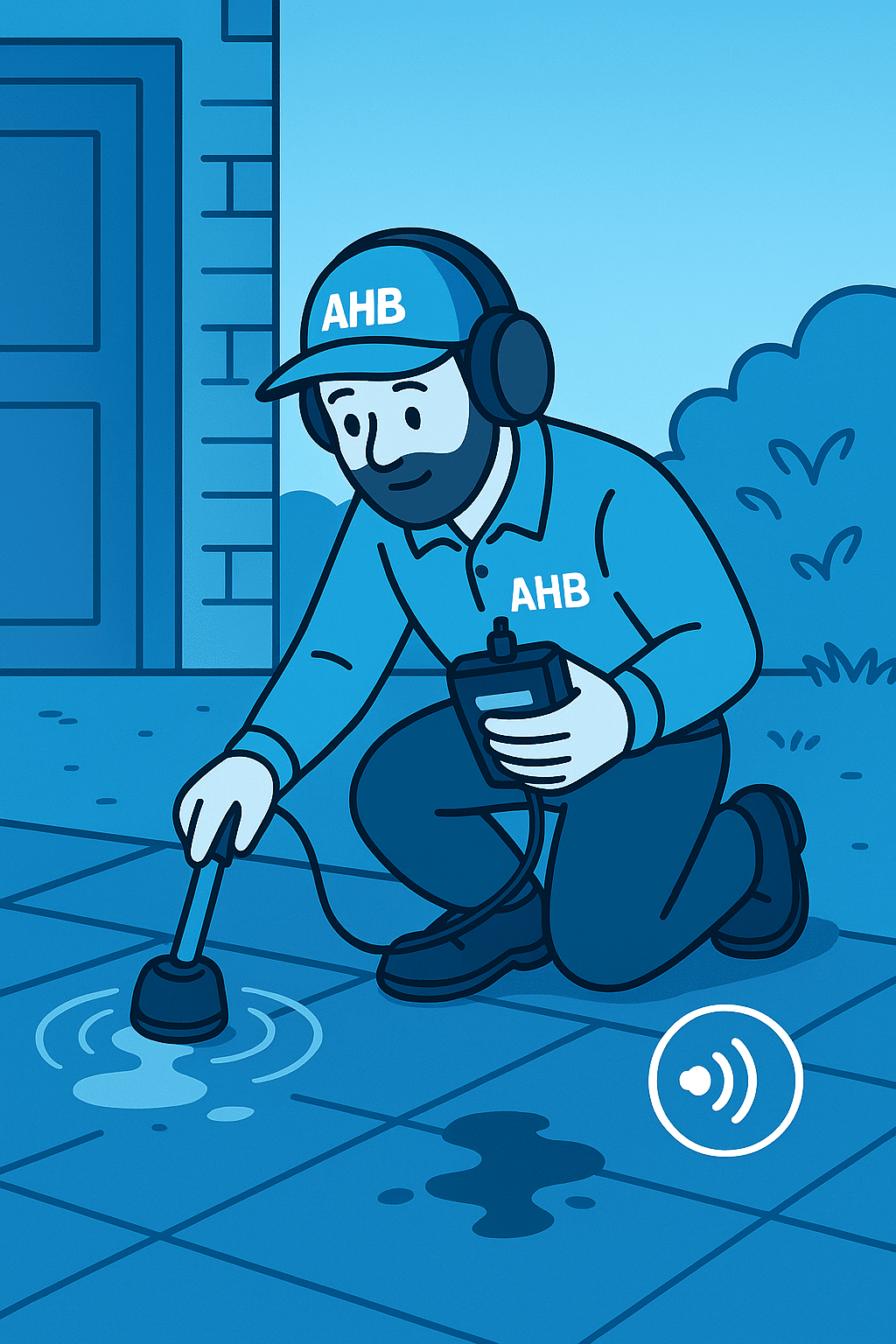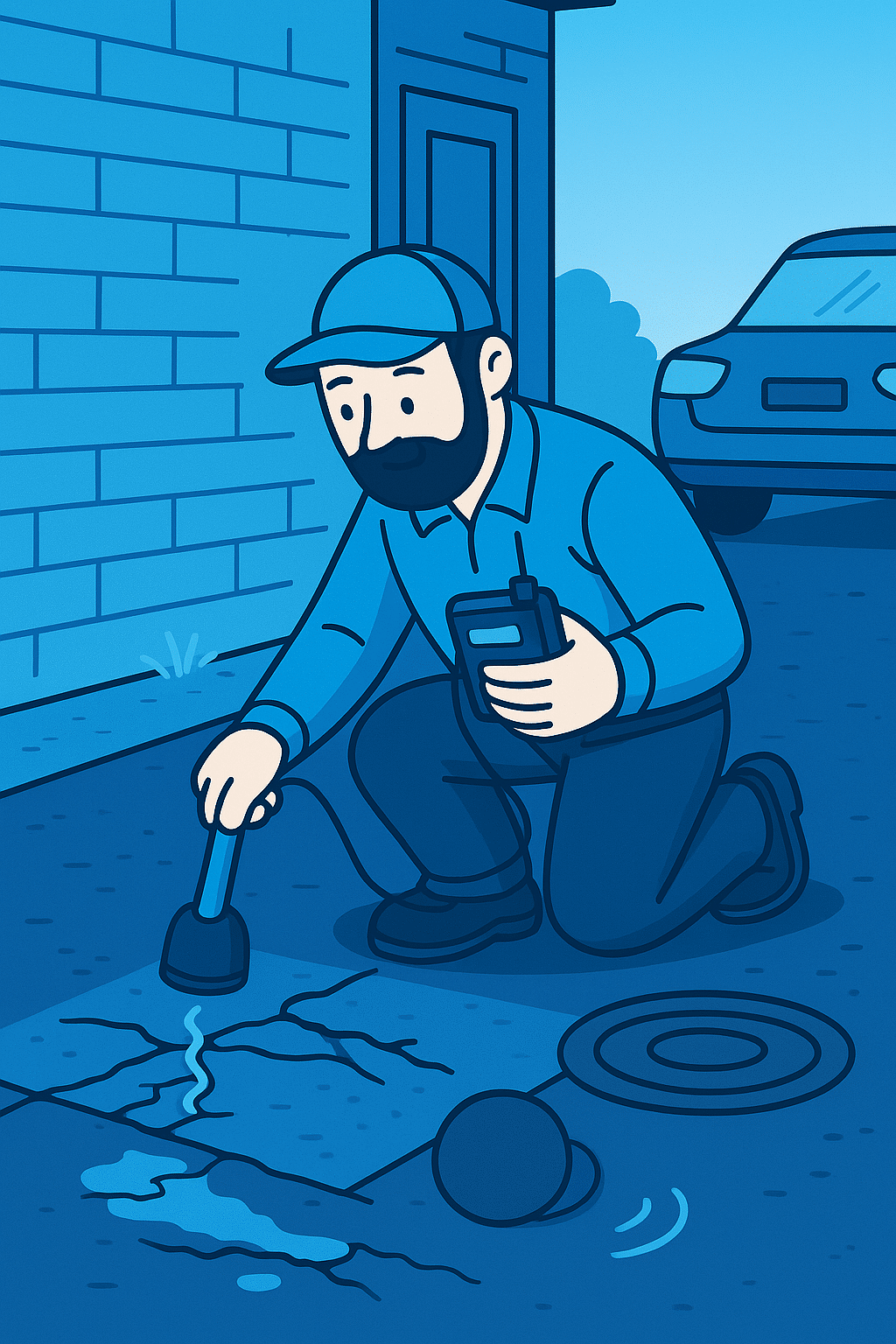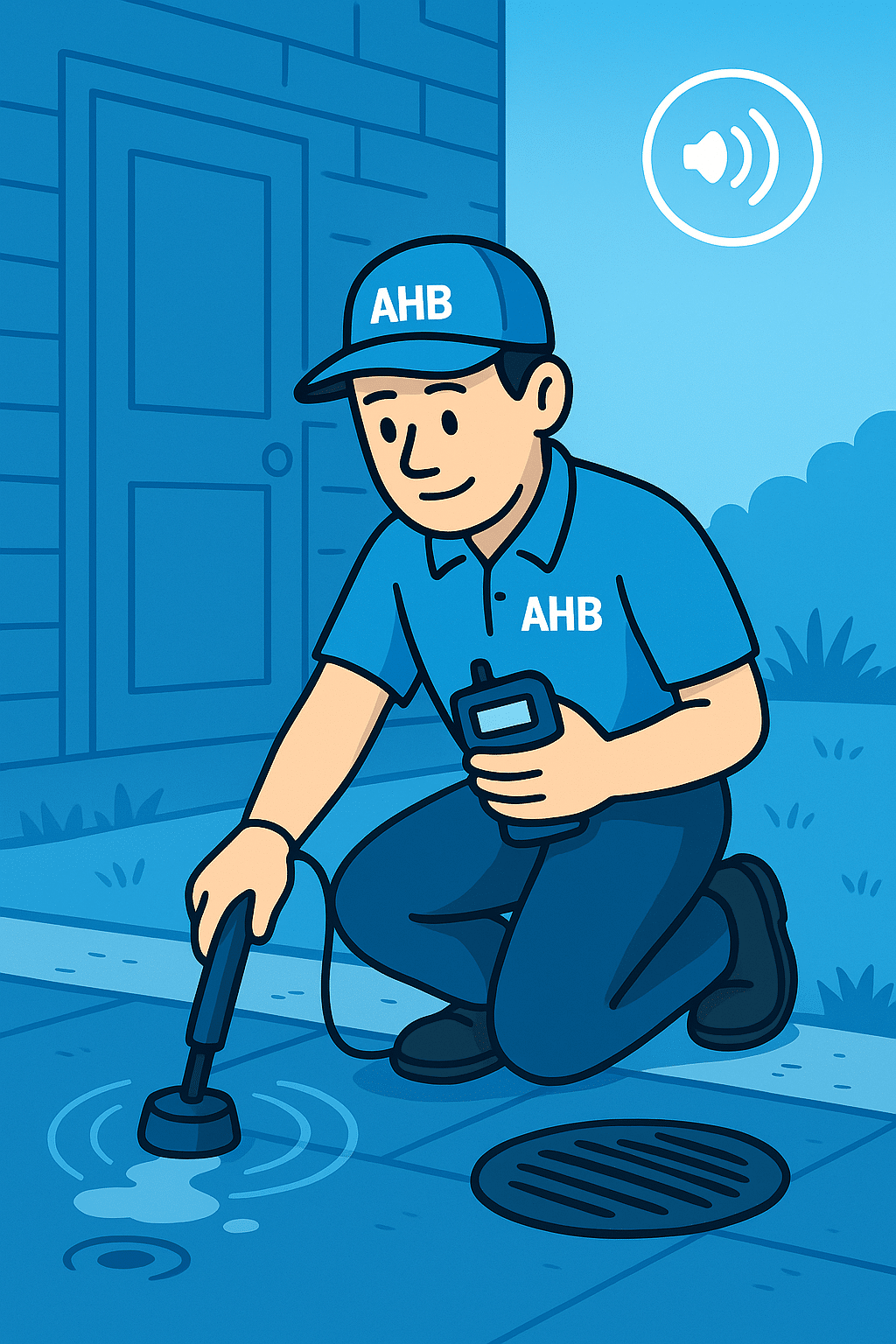When concrete foundations develop hidden water leaks, the damage escalates silently beneath your floors. Professional slab leak detection services protect your property from catastrophic foundation damage, using advanced acoustic technology, thermal imaging, and tracer gas to locate leaks without unnecessary excavation. As specialist slab leak detection experts serving the Midlands and beyond.
Fast response within 5 mins – 30 mins 🚀
↓ Get In Touch Now ↓

⚠️ Critical Alert: A slab leak can waste 2,700 litres monthly through just a 1mm crack. But here's what keeps me up at night - that water's undermining your foundation, corroding reinforcement steel, and creating voids that'll eventually crack your floors. Every day you delay slab leak detection means more structural damage that'll cost thousands to repair.
Right, let's cut through the confusion. A slab leak happens when pipes running through or beneath your concrete foundation fail. Could be copper corroding from soil chemistry, plastic stressed by foundation movement, or joints failing from years of thermal expansion. The concrete hides it brilliantly - until your floors start cracking, walls develop mysterious damp patches, or your water bill doubles overnight.
As leak finders who've spent years listening through concrete, I can tell you slab leaks are particularly nasty. Water can't escape upwards easily through concrete, so it spreads laterally, potentially affecting your entire ground floor before showing visible signs. That's why specialist slab leak detection isn't just helpful - it's essential for protecting your property's structural integrity.

Finding a water leak under concrete slab requires more than guesswork. Modern concrete slab leak detection combines multiple technologies because water behaves unpredictably beneath foundations. Here's how expert slab leak detection actually works:
Traditional detection fails when water travels horizontally through screed or along pipe bedding before surfacing. That damp patch in your hallway? The leak could be 10 metres away under your kitchen. Professional slab leak plumbing services use equipment that sees and hears through concrete, tracking water to its source without destroying your floors.
The challenge with concrete slab water leak scenarios is the material itself. Concrete dampens sound, blocks visual inspection, and masks temperature differences. That's why we deploy multiple detection methods - what one technology misses, another reveals. This systematic approach means over 95% success rate finding slab leaks on first visit.
Pressurised water escaping creates vibrations that travel through concrete. Our acoustic pipeline leak detection equipment amplifies these frequencies, pinpointing leaks through reinforced slabs up to 300mm thick.
When acoustic signals are weak, we introduce safe hydrogen/nitrogen mixture into drained pipes. The gas escapes through breaches and rises through concrete joints. Pinpoint leaks through the thickest foundations with this method.
Temperature variations reveal water presence beneath slabs. Cold mains water creates detectable patterns at surface level. Our thermal water leak detector maps these differences, especially effective for hot water pipes.
Isolating pipe sections confirms leak presence and severity. Essential for insurance documentation and determining whether it's a plumbing leak test failure or foundation issue.
Before detection begins, we trace pipe routes through your slab using electromagnetic locators. Knowing pipe positions prevents unnecessary drilling and focuses detection efforts.
Systematic moisture readings across your floor reveal water migration patterns. This data supports insurance claims and helps determine repair scope.
Slab leaks whisper before they shout. Here's what I look for during initial assessments:
Warm spots on floors indicate hot water leaks - your pets might sleep there. Cold patches suggest mains water escaping. Cracks appearing in floors or walls often follow water-weakened areas. If you notice mould along skirting boards or carpet edges staying damp, that's moisture wicking up from below. Foundation cracks, especially diagonal ones, scream "slab leak" to experienced detection specialists.
Put your ear to the floor at night when it's quiet. Hear rushing water? That's a pressurised leak beneath your slab. Your water meter clicking when everything's off confirms active water loss. Sometimes you'll hear the boiler firing unexpectedly - that's it replacing lost hot water from under slab leak situations.
Water bills increasing steadily over months often indicate developing slab water leak problems. A sudden spike means the leak's worsened significantly. Calculate your daily usage - if it's jumped by 50+ litres with no lifestyle changes, you need slab leak detection near me services immediately.
💡 Insurance Tip: Most buildings insurance covers "trace and access experts" costs for finding leaks. Document everything - photos of damage, meter readings, bills. Our slab leak detection company provides comprehensive reports meeting all insurer requirements. Act quickly - delays can void coverage under "gradual damage" clauses.

After years investigating leak under concrete slab scenarios, patterns emerge. Understanding causes helps prevent future failures:
Copper pipes react with soil minerals, developing pinhole leaks over 15-20 years. Concrete's alkalinity accelerates this process. Hot water pipes corrode faster - the temperature increases chemical reactions. If your property's over 25 years old with original copper, preventative slab leak detection services could save thousands.
Houses settle - it's natural. But pipes rigid in concrete can't flex with movement. Stress concentrates at joints and bends, eventually causing failure. Clay soils expanding and contracting seasonally make this worse. Tree roots seeking water add pressure, crushing pipes gradually.
Pipes laid directly on rebar or sharp aggregate develop leaks from abrasion. Insufficient expansion joints mean thermal movement cracks pipes. Kinked pipes during installation create weak points. These manufacturing defects often take years to manifest as slab leaks.
Pressure over 4 bar stresses joints constantly. Water hammer from fast-closing valves sends shock waves through pipes. These pressure spikes eventually fatigue materials, causing concrete slab leak repair needs. Installing pressure reducing valves prevents many slab leak problems.
Free phone assessment discussing symptoms, property age, and previous plumbing work. We'll determine if you need slab leak detection and repair or if the issue's elsewhere. Fixed-price quotation provided based on property size and complexity.
On-site assessment checking for visible signs - cracks, damp patches, warm spots. Moisture meter readings across affected areas establish baseline data. Water meter tests confirm active leaks.
Electronic location equipment traces pipes through your slab. We mark routes on floors with removable chalk, noting depths and material types. This prevents drilling blind and focuses detection efforts.
Deploy appropriate equipment - acoustic for pressurised pipes, thermal for temperature differences, tracer gas for confirmation. Multiple methods ensure accuracy before any concrete work begins.
Mark leak location on floor surface. Provide depth estimate and pipe details for repair planning. Typically, we narrow it down to within 500mm - enough for targeted access without extensive demolition.
Comprehensive report with photos, moisture readings, detection data, and repair recommendations. Insurance-ready documentation includes method statements and equipment used. Clear explanation helps you understand next steps.
Once our slab leak detector equipment locates the problem, repair methods vary based on damage extent and pipe condition:
Core drilling through concrete at leak location. Typical hole size 300-400mm - minimal compared to exploratory digging. Simple joint replacement or pipe section renewal usually suffices. Concrete reinstatement same day, though full curing takes 48 hours. Most fixing a slab leak jobs complete within one day.
Sometimes bypassing the slab makes more sense than concrete slab leak repair. Run new pipes through walls or ceilings, abandoning failed under-slab sections. No concrete work needed, faster completion, and future leaks are easier to access. Popular choice for multiple leak scenarios.
Trenchless technology coats pipe interiors with epoxy resin, sealing leaks from inside. Works for straight pipe runs without major damage. Minimal disruption but requires specific conditions - not suitable for all slab leak repair companies to attempt.
When multiple leaks indicate systemic failure, complete replacement prevents future problems. Modern materials like PEX resist corrosion and handle movement better. Though initially costly, it's often cheaper than repeated plumbers slab leak repair callouts.
"Charlie found our slab leak after three plumbers failed. Water was travelling through the screed from kitchen to hallway - completely wrong area from where everyone was looking! His tracer gas went straight to the source. One small hole in kitchen floor, leak fixed same day. Insurance covered everything with his detailed report. Saved us from ripping up entire ground floor." - Margaret, Cannock

Different properties require tailored approaches to water leak under concrete floor detection:
Businesses can't afford disruption from water leak under slab situations. Our commercial water leak detection services work outside hours, minimising operational impact whilst protecting stock and equipment from water damage.
Properties with underfloor water leak detection needs require specialist approach. Heating pipes in screed develop different failure patterns. We differentiate between heating leaks and water supply issues accurately.
Pool surrounds with suspected leaks need careful investigation. Our pool leak detection services check both structural shells and underground pipework running beneath pool decking.
Listed properties with solid floors require sympathetic detection methods. We understand conservation requirements whilst providing thorough slab leak detection and repair services that preserve architectural features.
Suspended concrete floors between levels need different techniques than ground slabs. We adapt our methods for these complex water leak under concrete slab scenarios.
✅ Prevention Programme: Annual pressure testing catches problems early. Water pressure regulation prevents stress failures. Soil treatment reduces corrosion risk. Water quality monitoring identifies aggressive chemistry. Regular professional inspections by a slab leak detection company prevent emergencies. Small investment, massive protection.
Here's what I recommend to clients after slab leak repair:
If you suspect an active slab water leak, immediate action prevents extensive damage:
Turn off water at main stopcock immediately. Switch off boiler and immersion heaters to prevent dry firing. If water's near electrics, isolate power at consumer unit. Open lowest tap to drain residual pressure. Document visible damage with photos for insurance. Move furniture and valuables from affected areas.
Don't start drilling holes hoping to find the leak - you'll cause unnecessary damage insurance won't cover. Avoid using leak sealant products - they rarely work for slab leaks and contaminate pipes. Don't ignore small signs hoping they'll improve - slab leaks only worsen. Never attempt concrete work without proper leak location - you might miss the actual source.
DIY attempts at finding slab leaks usually create more problems than they solve. Here's why expert slab leak detection services make the difference:
| DIY Approach | Professional Detection |
|---|---|
| Multiple exploratory holes | Single targeted access point |
| Guesswork based on symptoms | Technology-confirmed location |
| No insurance documentation | Comprehensive reports provided |
| Risk of utility strikes | Safe pipe mapping first |
| Often misses actual leak | Over 95% first-visit success |
| Days of disruption | Usually resolved same day |
Professional leak detection save money by preventing unnecessary damage. One precisely located access point versus multiple exploratory holes. Insurance-compliant reports versus claim rejection. Guaranteed results versus costly guesswork.
Not all slabs are created equal. Different construction methods require adapted detection approaches:
Voids beneath beams allow water to travel freely, complicating detection. We use endoscopic cameras through small access points, combined with thermal imaging to track water movement. These foundations often hide significant water accumulation before showing symptoms.
Thick reinforced slabs dampen acoustic signals significantly. Tracer gas excels here, finding paths through construction joints. Central heating water leak detection in these slabs requires patience and multiple detection methods.
Concrete floors with crawl spaces beneath offer access advantages. We can often detect from below, avoiding any floor damage. Moisture patterns on slab undersides reveal leak locations clearly.
These require extreme caution - hitting tension cables during access is catastrophic. Our detection process includes cable mapping before any concrete work. Only experienced slab leak repair companies should attempt these repairs.
Beyond property damage, slab leaks waste precious resources:
A small 2mm slab leak loses approximately 150 litres daily - that's 54,000 litres annually. Enough water for one person's yearly drinking needs wasted into the ground. Multiply that across thousands of undetected leaks nationwide, and we're talking millions of litres lost when main water pipe leak and underground water leak detection company services could prevent this waste.
Energy waste compounds the problem. Hot water leaks mean boilers run constantly, burning gas unnecessarily. That's increased carbon emissions and higher energy bills - double environmental impact from one hidden leak.
Don't let a hidden slab leak undermine your property's structure and drain your finances. With over 95% success rate locating leaks through concrete, comprehensive insurance reports, and minimal disruption to your floors, we're the slab leak detection specialists you can trust. Our advanced equipment finds leaks others miss, saving you thousands in unnecessary excavation and structural repairs.
Get A Quote Today Call Charlie on 07822 024 661 Get in Contact TodayOur Happy Customers 😊